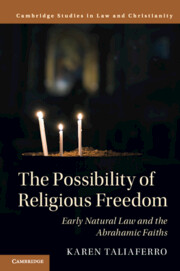Book contents
- The Possibility of Religious Freedom
- Law and Christianity
- The Possibility of Religious Freedom
- Copyright page
- Dedication
- Contents
- Preface
- Acknowledgments
- 1 Religion and Law in Late Modernity
- 2 Antigone: The Tragedy of Human and Divine Law
- 3 Maimonides’ Middle Way: Teleology as a Guide for the Perplexed
- 4 Between Sharīʿa and Human Law: Ibn Rushd and the Unwritten Law of Nature
- 5 Arguing Natural Law: Tertullian and Religious Freedom in the Roman Empire
- Conclusion
- Epilogue
- Bibliography
- Index
5 - Arguing Natural Law: Tertullian and Religious Freedom in the Roman Empire
Published online by Cambridge University Press: 07 October 2019
- The Possibility of Religious Freedom
- Law and Christianity
- The Possibility of Religious Freedom
- Copyright page
- Dedication
- Contents
- Preface
- Acknowledgments
- 1 Religion and Law in Late Modernity
- 2 Antigone: The Tragedy of Human and Divine Law
- 3 Maimonides’ Middle Way: Teleology as a Guide for the Perplexed
- 4 Between Sharīʿa and Human Law: Ibn Rushd and the Unwritten Law of Nature
- 5 Arguing Natural Law: Tertullian and Religious Freedom in the Roman Empire
- Conclusion
- Epilogue
- Bibliography
- Index
Summary
Chapter Five moves back in time and from theory to application, revealing the potential and the limitations of natural law theory in an actual political setting. It analyzes the political rhetoric of Tertullian, the Carthaginian Christian theologian who argued, against Roman policy, for universal religious freedom, using the term libertas religionis perhaps for the first time on record. This chapter provides a fresh reading of Tertullian’s writings as they concern religious freedom and related themes, drawing attention to his reliance on natural law argumentation. I analyze his epistemological commitments and link them to the commitments of the use of natural law by the other writers in the book. Finally, I argue that the effectiveness of Tertullian’s argument for universal religious freedom relied heavily on his use of natural law as a mediating device between human and divine law, with implications for the utility of natural law reasoning in a pluralistic public sphere.
- Type
- Chapter
- Information
- The Possibility of Religious FreedomEarly Natural Law and the Abrahamic Faiths, pp. 104 - 127Publisher: Cambridge University PressPrint publication year: 2019
- 1
- Cited by

